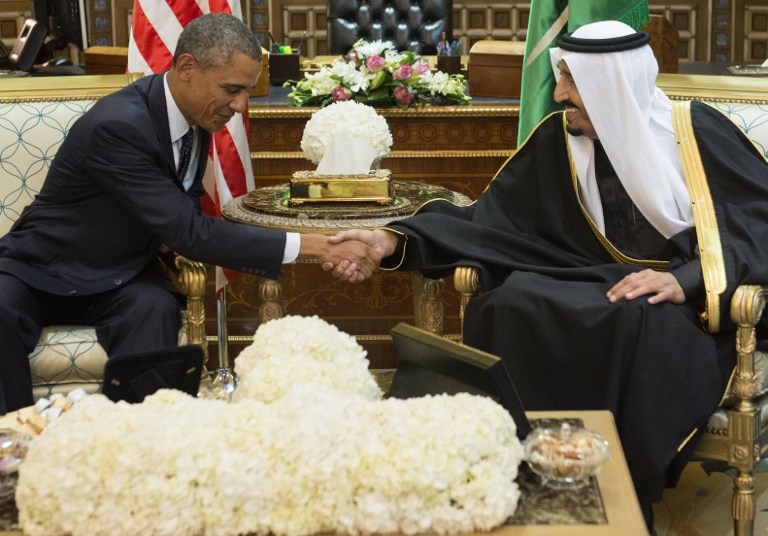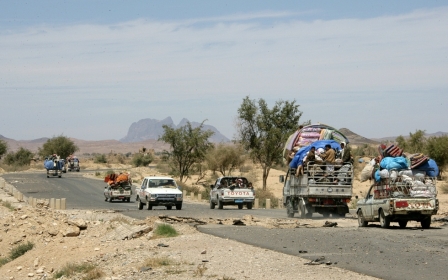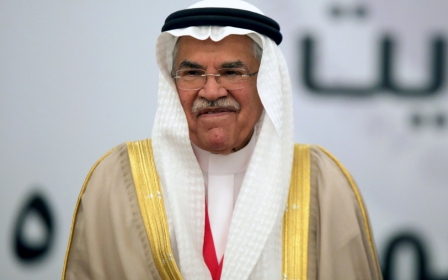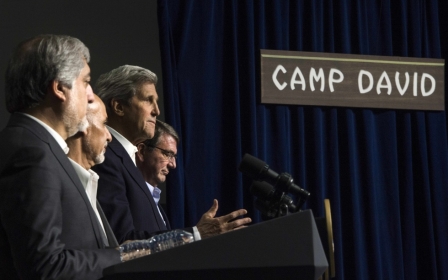Saudi king's US absence signals discontent with Iran policy

Discontent with American policy toward Iran is behind the last-minute pullout by Saudi King Salman from a summit with US President Barack Obama this week, analysts say.
Obama invited Salman along with five other Gulf rulers to the White House on Wednesday followed by a retreat the following day at Camp David.
He hopes to shore up wavering trust while Washington tries to reach a deal to curb the nuclear programme of Shiite Iran, the regional rival to Sunni-dominated Gulf monarchies.
Only the leaders of Kuwait and Qatar will now likely attend the summit, indicating "a lack of consideration, a disagreement and a lack of respect for President Barack Obama," said Abdelkhaleq Abdallah, an analyst from the United Arab Emirates.
Abdallah said "the differences of opinion seem profound" over Iran, which the Gulf states see as a source of regional instability that would increase after the signing of a proposed nuclear accord.
A framework agreement between Iran and the US, France and other major powers, currently being finalised, limits Tehran's nuclear capabilities in return for the lifting of crippling international sanctions.
The White House, which hoped the summit would ease the Gulf's deep unease over talks with Iran, said on Monday that Salman had called Obama to "express his regret at not being able to travel to Washington".
"The two leaders emphasised the strength of the two countries' partnership, based on their shared interest and commitment to the stability and prosperity of the region," the White House said.
Saudi seeks 'clearer commitment'
In place of Salman, Saudi Arabia is dispatching two powerful figures, Crown Prince and Interior Minister Mohammed bin Nayef and Salman's son, Deputy Crown Prince and Defence Minister Mohammed bin Salman.
"You don't usually send two of the most senior people you have to deliver a snub," said Anthony Cordesman, of the Center for Strategic and International Studies in Washington.
But by "downgrading" the delegation, the kingdom was "attempting to put pressure on the US," he said.
"It's a sign that Saudi Arabia would like to see a clearer US strategic commitment to the defence of the Gulf, and clearer signs about how the US intends to deal with Iran."
Saudi Foreign Minister Adel al-Jubeir on Monday insisted Salman's absence was not a snub.
"This is not related in any way, shape or form to any disagreement between the two countries," he said in Washington.
Jubeir earlier explained the king would miss the gathering "due to the timing of the summit," which coincides with a five-day ceasefire in Yemen to begin Tuesday night, and with the opening of a humanitarian aid centre for the neighbouring country.
Since 26 March Saudi Arabia has led an Arab-dominated coalition conducting airstrikes against Iran-allied Houthi rebels in Yemen, heightening tensions with Tehran.
White House not concerned
Despite King Salman’s last-minute announcement to send Crown Prince Mohammed bin Nayef in his place, the White House says it does not feel snubbed by the move.
"This is not just a photo op," said White House spokesman Josh Earnest. The summit "is an opportunity for us to have a substantive discussion about how to deepen and modernise the security relationship between the United States and our GCC allies."
Countries participating in the meeting must have decided about who would be best positioned to represent their countries at the meeting, Earnest said.
Concerning the analysts' speculation that the Saudi move is a sign of displeasure with the Obama administration, Ernest said: "I know there had been some speculation that this change in travel plans was an attempt to send a message to the United States. If so, that message was not received, because all the feedback that we've received from the Saudis has been positive," Earnest said.
The summit will allow the six-member Gulf Cooperation Council to discuss ways of "deepening security cooperation," according to a recent White House statement.
'Still at the table'
Gulf states were already concerned about Iran's role in Iraq, Syria and Lebanon.
At a cabinet meeting on Monday, the king praised US support for initiatives aimed at achieving regional stability.
He expressed hopes the Washington talks would "strengthen coordination and cooperation between both sides", the official Saudi Press Agency said.
According to Abdallah, Gulf leaders fear "hardliners in the Iranian regime are going to use this (nuclear) agreement to commit themselves to new adventures and more financing" of pro-Tehran militia in the Middle East.
Obama, on the other hand, considers that Iran "will be a factor for stability".
The Gulf's "modest" participation at the US summit does not portend a reconciling of the two viewpoints, Abdallah said.
"The Saudis aren't happy about the deal (proposed with Iran) but they still want to be at the table," a Western diplomatic source said.
"Washington will get a fairly strong message from everyone," the source added.
"The Americans are only concerned with the nuclear issue of Iran. They are not concerned with Iranian intervention in our part of the world," said Jamal Khashoggi, an analyst and head of the Alarab News Channel, which is linked to the royal family.
Officials indicated King Hamad of Bahrain, Saudi Arabia's close ally, would also miss the Washington talks, while Oman's Sultan Qaboos has been ill.
UAE President Sheikh Khalifa bin Zayed al-Nahyan is also unwell and has not appeared in public since last year.
Khashoggi said even in the absence of the other leaders and King Salman himself, the presence of Saudi Arabia's powerful crown prince and his deputy mean "the summit is important".
Saudi Arabia in the next few years will seek to restructure the Middle East to free it from Iranian "intervention," he said. "That needs American support and understanding."
Middle East Eye propose une couverture et une analyse indépendantes et incomparables du Moyen-Orient, de l’Afrique du Nord et d’autres régions du monde. Pour en savoir plus sur la reprise de ce contenu et les frais qui s’appliquent, veuillez remplir ce formulaire [en anglais]. Pour en savoir plus sur MEE, cliquez ici [en anglais].




